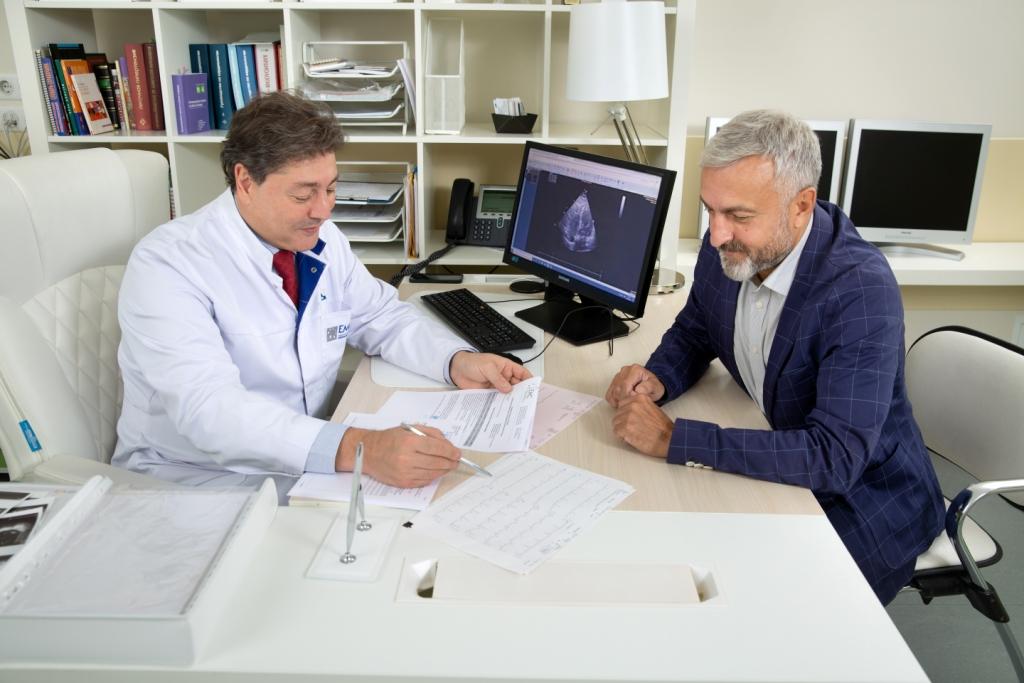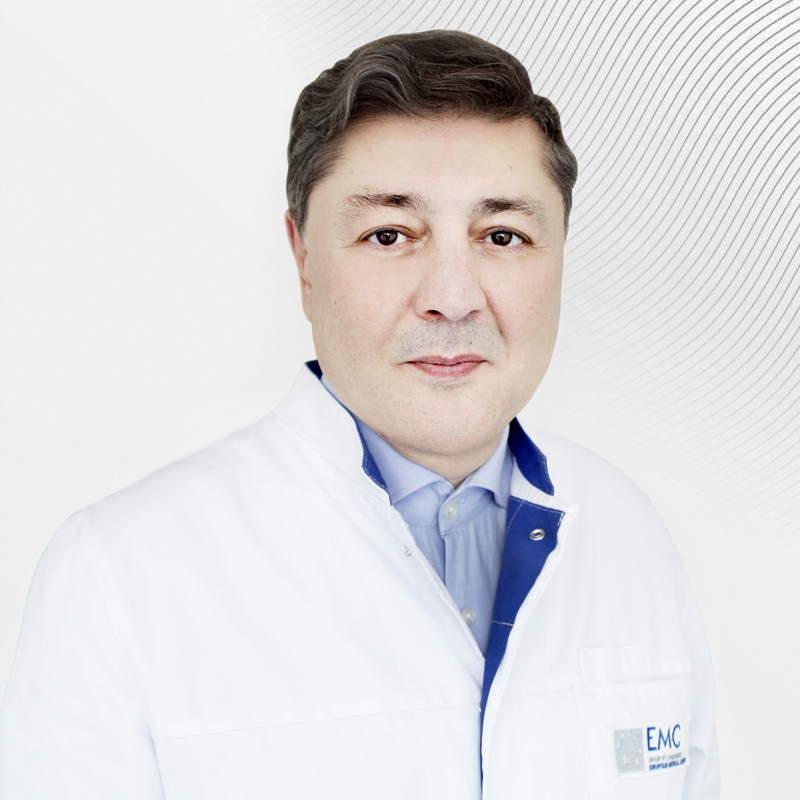Radiofrequency ablation of the heart (RF)
Radiofrequency catheter ablation is an effective method of treating tachyarrhythmias and, being a fairly safe procedure, can permanently eliminate the cause of cardiac arrhythmia.
The essence of the radiofrequency ablation procedure is the destruction of heart tissue, causing an abnormal heart rhythm. In some cases, ablation prevents abnormal electrical signals from entering the heart and thus stops the arrhythmia.

Radiofrequency ablation is performed using a catheter, which is a thin flexible tube that is inserted through the femoral or subclavian vein, or femoral artery. An impulse is applied through the conductor, destroying the pathological focus, causing arrhythmia – by exposure to high-frequency current or low temperature, reaching -80C.
What is ablation for?
Cardiac arrhythmias occur due to the twisting of electrical impulses that set the heartbeat – the heart beats too fast, slowly, or irregularly.
Radiofrequency ablation is performed in cases where:
- medications for the treatment of arrhythmia have proven ineffective
- serious side effects have appeared from medications for the treatment of arrhythmia
- in certain types of arrhythmias that respond well to ablation, such as Wolf-Parkinson-White syndrome and supraventricular tachycardia
- the patient has a high risk of developing complications from arrhythmia (sudden cardiac death, heart failure, loss of consciousness, etc.)
Indications for conducting RF
Supraventricular rhythm disorders:
- atrioventricular nodular reciprocal tachycardia (AVRT),
- atrioventricular reciprocal tachycardia (AVRT) associated with the functioning of an additional pathway (DPP)
- atrial tachycardia (PT)
- atrial fibrillation (AF)
- atrial flutter (TP)
- atrial extrasystole
Ventricular arrhythmias:
- ventricular extrasystole
- idiopathic ventricular tachycardia
- ventricular tachycardia on the background of structural heart diseases.
The effectiveness of surgery for atrioventricular nodular reciprocal tachycardia (AVRT) is 95-98%, WPW syndrome (Wolf-Parkinson-White syndrome)- more than 98%, atrial flutter — 90-95%.
In paroxysmal forms of atrial fibrillation, the effectiveness of primary procedures is 65-75%, secondary surgery makes it possible to achieve efficiency and improve the quality of life in 90% of patients.
Preparation for radiofrequency ablation
Before the procedure, you may be prescribed a medical examination to assess the state of the cardiovascular system (blood tests, ECG, ECHOCG, MSCT of the heart, etc.). On the night before the procedure, you should refrain from eating and drinking water. If you are taking medications, ask your doctor if you should take them before the procedure. Be sure to tell your doctor or nurse if you are allergic to medications.
If you have an implanted pacemaker or cardioverter defibrillator, ask your doctor if you should take special precautions.
How is the procedure going?
The ablation procedure is performed in a hospital in the X-ray room under local or general anesthesia. After anesthesia, the doctor inserts a diagnostic catheter through a puncture in the femoral vein or artery or subclavian vein and brings it to the heart. The first stage is an electrophysiological examination of the heart (EFI). Electrodes are located at the end of the catheter, which provide electrical impulses and record the electrical activity of the heart. This procedure is called heart mapping.
The study allows you to accurately identify the arrhythmogenic areas, after which the doctor begins the treatment procedure. The catheter is brought directly to the pathological focus, a high-frequency current is supplied through the conductor, which allows to destroy the area of tissue responsible for the irregular rhythm. Sometimes extremely low temperatures are used instead of current. In this case, the procedure is called cryoablation, or cold ablation. The electrophysiological laboratory has all the necessary equipment and medicines for the safe examination and relief of arrhythmias.
Approximately 20 minutes after the effective effects, a repeated electrophysiological examination of the heart is performed to assess the effectiveness of the procedure.
The duration of cardiac ablation is usually from two to five hours, in difficult cases the procedure may take longer.
After the procedure is completed and the electrodes are removed, pressure bandages are applied to prevent bleeding in the puncture area. On the first day, bed rest should be observed, which helps to stabilize the patient's condition. Depending on your condition, you can return home the same day or stay in the hospital. If you go home, plan for someone else to drive you after the procedure.
Minor pain or discomfort in the heart area after radiofrequency ablation should not be bothered for more than a week. You will be able to return to your normal activities within a few days after the procedure.
Recommendations after RF
Radiofrequency and cryoablation are highly effective and in most cases make it possible to permanently eliminate the cause of rhythm disturbances, save the patient from having to constantly take medications, while maintaining the ability to lead an active lifestyle.
In rare cases, it may be necessary to repeat the procedure.
To maintain heart health after ablation, it is recommended to change lifestyle in order to prevent diseases or conditions that can cause or worsen arrhythmia, for example, monitor blood pressure, thyroid hormones, blood sugar, etc.
General recommendations after ablation:
- Consume less salt, which can help lower blood pressure
- Increase physical activity
- Quit smoking
- Do not drink alcohol
- Adhere to the principles of healthy eating
- Monitor body weight
Radiofrequency ablation in EMC
The doctors of the EMC Heart and Vascular Clinic provide assistance with all types of arrhythmias, including rare and difficult to treat.
In our clinic, it is possible to perform ablation in patients with somatic diseases, in elderly patients, as well as in children (planned RFA is indicated for children over 5 years old) with and without congenital heart defects.
The operations are performed by one of the leading Russian specialists in the field of endovascular surgery and arrhythmology, Ph.D. Dr. Farhad Rzaev.
At EMC, the ablation procedure is performed using the most advanced technology. The electrophysiology laboratory is equipped with the CARTO® 3 navigation system, a modern and most accurate technology for three—dimensional mapping of the heart in real time.
The Prucka CardioLab IT series electrophysiological monitoring system represents a new level of efficiency and unsurpassed quality of electrophysiological monitoring.
The clinic is also equipped with the latest SmartAblate radiofrequency ablation system and cryoablation system. All this helps to accurately identify the pathological focus and carry out treatment with maximum efficiency.
Contraindications
There are no absolute contraindications for radiofrequency ablation, it can be performed in elderly patients and patients with concomitant diseases. Relative contraindications include acute infectious diseases, unstable angina pectoris, bacteremia/septicemia, acute decompensated heart failure, endocarditis, as well as allergic reactions to contrast media and iodine intolerance. A discussion of the risks, benefits, and alternatives of ablation for deciding on surgery is conducted jointly with an electrophysiologist.
The number of complications in EMC is less than 1%. Possible complications include hemopericardium (accumulation of fluid in the heart sac), hematomas in the puncture area, and phrenic nerve paresis (only during cryotherapy). All complications are effectively eliminated during the hospital period.
RF cost
The final cost of an RF operation is determined individually, depending on the patient's condition, the complexity of the procedure, the need for additional research, and other factors. At EMC, the operation is performed by one of the best Russian specialists and hospitalized in a comfortable hospital equipped according to international standards.
Doctors
.jpg)
- He was actively involved in the development of algorithms for discriminating supraventricular tachycardia from ventricular tachycardia in multi-chamber cardioverter defibrillators.
- He graduated from the Pediatric Faculty of the Russian State Medical University named after N.I. Pirogov in Moscow.
- He has certificates of cardiovascular surgery, radiology, X-ray-endovascular methods of diagnosis and treatment.




